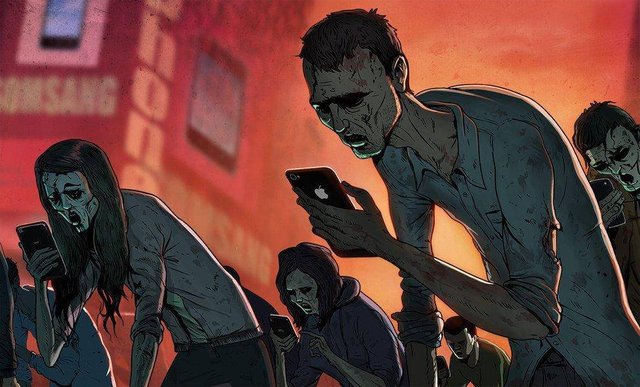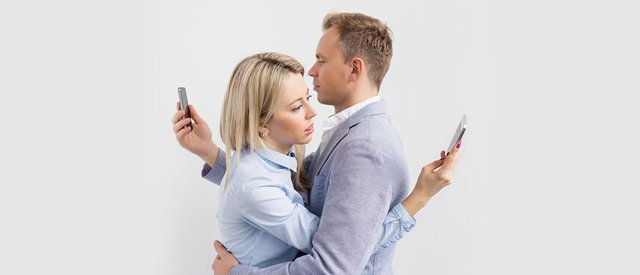Social Media Self-Exclusion

I come from the online gambling industry. This sector is highly regulated for the several risks it implies. The most direct risk for society is addiction. At PokerStars, we put enormous efforts to avoid that our players develop addiction to our games. We have an array of tools to monitor and contain compulsive gambling and we constantly look at new ways to make our platform a safe place for healthy entertainment.
If for any reason, you feel that you are playing too much, you can still self-exclude from our games for a certain period of time. During this time, you won't be able to play even if you want to. It's a tool that recalls the technique used by Odysseus when he wanted to hear the sirens' chants. Odysseus ordered his men to tie him to the ship's mast while they were covering their ears with wax. He told them not to release him for any reason, while they were passing by the sirens' spot, even if he would have begged them to do so! His technique proved smart, but how would Odysseus manage modern sirens?

Nowadays, we are surrounded by sirens everywhere. Every shop, every app and every site has some sirens tempting us to give them our money and our time.
Let's take social media. Every social platform is designed to be addictive. Notifications are always displayed in red, creating a sense of urgency that it's hard to resist. You always crave to check if your crush liked your post. You always want the upper hand in every futile discussion. You want to share that hilarious meme with your best buddy.
All this is fun, until it's too late.
The statistics showing social media addiction are greater than any gambling site, by far. Just consider that social media users are estimated to be 3.1 billion. That's more than the adult half of the world population!
Of these 3.1 billions, 2.9 billion are already mobile users, accessing their accounts on a daily basis.
210 million people are thought to use social media in an addictive, compulsive way.
What's more concerning is that addiction tendencies increase in teenagers groups. That's expected, considering that teens spend on average 9 hours on social media compared to the overall world average of 2 hours. This makes teenagers more likely to suffer from depression derived by social media abuse. When you're so young it's easy to think “I don't have enough likes, enough followers, enough retweets, enough DMs...”
I know these feelings, as sometimes I go through them too. I'm sure that at least intermittently, I have some compulsive behaviour when I check my social accounts. There are days I don't care, but there are other days when I check my phone every 10 minutes. These days I feel sad or anxious if I don't receive any text or any relevant like. When I publish a story, I want to check who's seen it first and how many of my “friends” will have looked at what I had posted. Is my crush among them...?

But unlike a teenager, I am aware there is a real world out there and because of this, I started wondering what's the impact of social media on my life. How much time do I waste on them? I don't have an accurate statistic, but it doesn't take much to figure out that I wasted too much time on them, time that I could dedicate to my work, my hobbies, my true friends, my dreams.
The first serious step I've taken has been to remove Facebook from my mobile. I've done it on several occasions, but this time around (February 2021) it's working better than the past. For the first time I don't miss it and I don't crave to post something. Even when I posted something, I didn't have problems with checking the “feedback” days later.
My next goal is to remove Messenger too, that still encourages addictive behaviours in me. I can't stand to have the red notifications about the unread messages. I always urge to “clean” those red numbers and make sure that all my incoming messages are read. When it comes to group conversations, I turn off the notifications to avoid a compulsive need to open the chat every two seconds!
Now, with Messenger I have a problem. To log off from it, you have to clean the phone cache or uninstall the app right away. Messenger is also useful to communicate with businesses in a quick way. Still I would like to try to lock myself out of this texting app at least for a couple of weeks, as well from Facebook as a whole, even from my PC.
I've been looking for a system that could protect me from Facebook, just like the rope around the mast protected Odysseus from the sirens. I must not be able to log in on Facebook even if I crave for it! But how?
Facebook has no such protection system. I should invent it myself. I tried to come up with an idea borrowed from Bitcoin: encryption. I thought it could be a great move to generate a new password and use a time-lock encryption to hide such password from myself until when I will detox (let's say two weeks).
I started to jot down a concept of an app that would work like this:
- Open the app
- Click a Generate Password button
- Set that password in your Social Media as your new password
- Encrypt password for [X] time
- Log out from your social media
- You won't be able to see your password again until the encryption expires
The only problem with this system is that it can't protect you from a Recover Password, that certainly you will use when caught by abstinence crisis.
So what's the solution? The solution might be simpler than you thought: regulation.
I'm always against excessive regulation, like the stricter and stricter AML requirements that made using our money a hell. But basic regulation, aimed to protect people's health is the foundation of every civilized society.
After all, we had already this massive effort to protect who's vulnerable to COVID-19. Yes, COVID-19 is perceived as an immediate risk, while social media addiction doesn't fill up our hospitals altogether. But they don't because harm from social media is not direct and so it's not easily measurable. We can assume that out of those 210 million people addicted to social media, many are at risk of suicide, a risk that I know well. It takes a little to be tired of living. Even if we estimate a conservative 1%, we can have 2.1 million of people dying of suicide induced by social media abuse. That's more or less the same amount of deaths from COVID-19 during 2020. And you can be sure that in the years to come, these sad numbers are set to increase. Many teenagers may not be able to turn 18.
What can be done?
First of all, a regulating body should collect all the data to measure clearly the impact social media have on our society. After that, we can have a better understanding of the protective measures to put in place.
For sure the main protection measure every social media platform should implement is the Self-Exclusion. This powerful tool makes wonders against addictive gambling. In the best jurisdictions they even have a national database of self-excluded players, so that once they self-exclude from one site, they won't be able to register on another. Now this last feature might be excessive about social media, but it gives you an idea of the organizational level we reached in the gambling industry to protect players!
Another way to protect the users' psyche could be to change how notifications are displayed. The red colour should be banned, as our brains are too sensitive to it. Red spells danger, emergency, urgency and because of that it is addictive.
A hypothetical “social media license” should have guidelines to remove any trick that creates in the user that sense of urgency which leads people to check their phones even when they drive or are supposed to sleep.
I'm not sure there is any will to work on anything like this, but I am throwing my 2 cents with the hope they can make this world better.